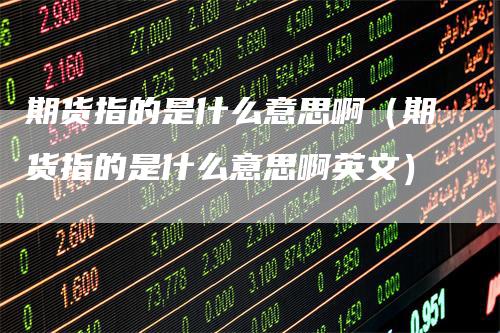
What is the meaning of futures?
Futures refer to a financial contract in which a buyer and a seller agree to exchange a specified quantity of a particular asset at a predetermined price on a future date. It is a derivative product that allows participants to speculate on the future price of the asset and hedge against potential price volatility.
How do futures work?
In a futures contract, both the buyer and the seller are obligated to fulfill their respective roles. The buyer agrees to purchase the asset at the predetermined price, while the seller agrees to provide the asset at the agreed-upon price. The contract typically specifies the delivery date and the quality or specifications of the asset.
What are the benefits of trading futures?
Trading futures offers several advantages. Firstly, it provides an opportunity for price discovery, as futures prices reflect market expectations of future asset prices. Additionally, futures allow participants to hedge against price movements, reducing the risk associated with volatile markets. Moreover, futures trading offers liquidity and flexibility, as they can be bought or sold before the delivery date.
Who are the participants in futures trading?
Futures markets involve a variety of participants. These include speculators, who aim to profit from price fluctuations, and hedgers, who seek to minimize the risk of adverse price movements. Additionally, there are arbitrageurs who exploit price discrepancies between related assets in different markets. Institutional investors, such as banks and pension funds, also participate in futures trading.
What types of assets can be traded as futures?
Almost any tradable asset can have a futures contract associated with it. Commonly traded assets include commodities (such as oil, gold, and agricultural products), stock market indices, currencies, and interest rates. The availability of futures contracts varies across different exchanges and jurisdictions.
Are there risks involved in futures trading?
Like any investment, futures trading carries risks. The main risk is the potential for price movements to go against the participant's expectations, resulting in financial losses. Other risks include counterparty risk (the risk that the other party may not fulfill their obligations) and systemic risks (such as market-wide volatility or regulatory changes). It is essential for traders to thoroughly understand the risks associated with futures trading before participating.
Conclusion
Overall, futures trading provides a platform for participants to speculate on the future price of various assets and hedge against price volatility. It offers opportunities for profit, price discovery, and risk management. However, it is important to approach futures trading with caution and understanding of the risks involved.